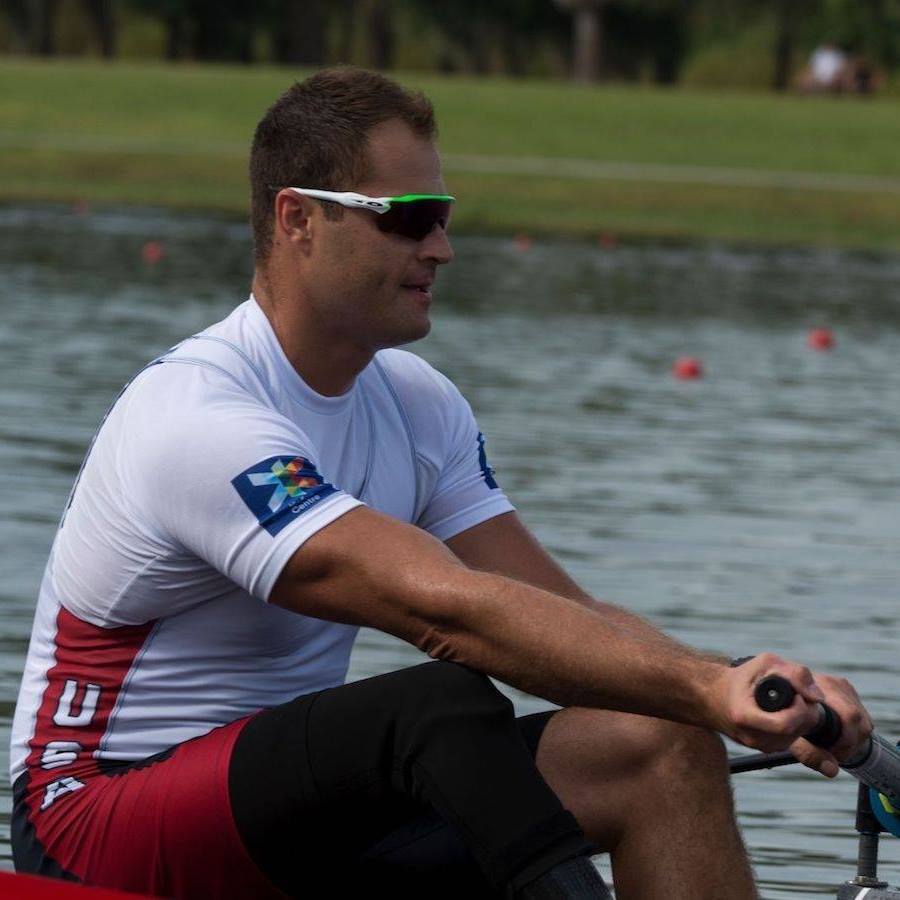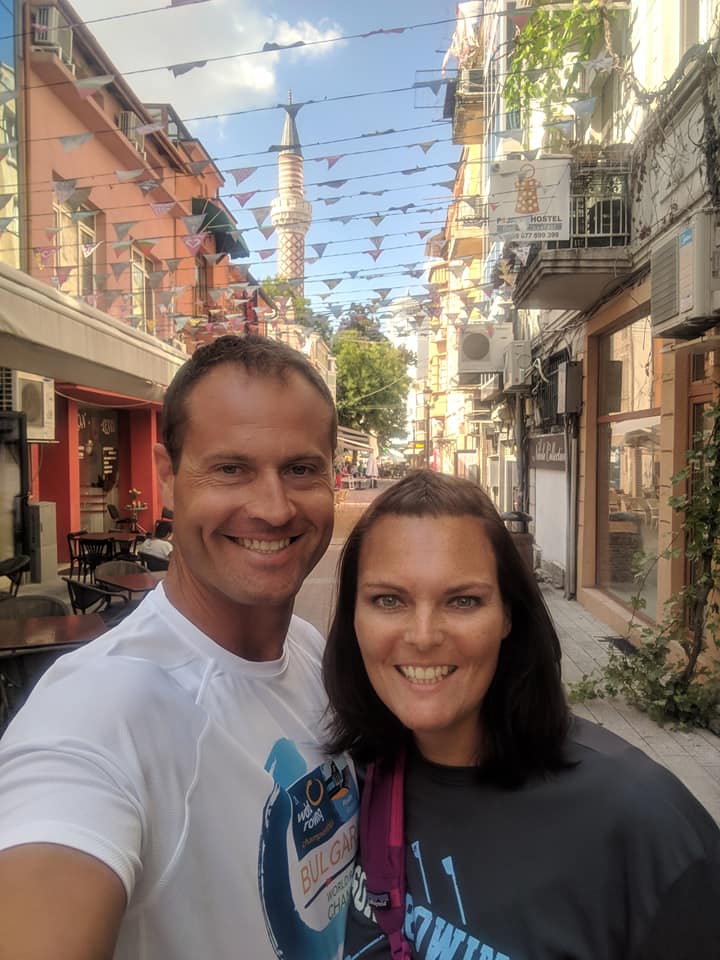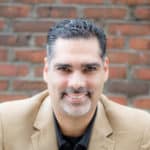In this recurring special feature, Nonahood News recognizes and honors those everyday heroes who have served or are currently serving our country and making a difference in our community. Those who reside in the Lake Nona and surrounding area are our Nona Heroes.
Lake Nona is a community that continues to set the bar of distinction higher with each day. Mike Varro, a Paralympic rower and prosthetist at Lake Nona’s Veteran Affairs (VA) hospital, is no exception.
Varro has given back to the community by making and fitting heroes, who have served our country, with prosthetic limbs. For about 10 years now, Varro has served the VA hospitals in Oklahoma City, Los Angeles and Gainesville.
A civilian amputee, Varro mentioned he faced a birth complication in which his foot never formed properly. When he was 11 years old, he received surgery at a Shriners Hospital for Children. It was that surgery that helped him carve out his path for his current career.
“I had a good experience, and that led me to believe that this wasn’t a bad experience at all. It was something that I held on to, especially in college,” Varro said.
At the University of Minnesota, Varro wasn’t sure his psychology degree would be useful to him. He spoke to a prosthetist who helped him understand he could still apply his degree to a prosthetics program. Allied with the field of orthotics, Varro took on a residency of prosthetics in Oklahoma City.
The program had a partnership with the VA, helping Varro put his foot in the door of the VA health care system. Varro mentioned that he almost immediately recognized how much he liked the system the VA had set up.

“The VA is nice because you don’t have to work with insurance to determine whether or not someone can afford a prosthesis or if the insurance will pay for it. For veterans, it doesn’t matter how much it costs, rather, if it is appropriate for them to get one and if it’s going to help them in any way. I’ve always enjoyed that,” Varro said.
Since moving to Lake Nona in 2016, Varro has found a place to continue his passion in prosthetics while cultivating one of his newest ones. Shortly after starting work at the local VA hospital, he was quickly introduced to the idea of rowing. At first, he mentioned, he was concerned about whether he was the right stature, being rather tall. But the Paralympic rower who introduced the idea to Varro mentioned his height was, in fact, an advantage.
Soon enough, his interest in rowing grew, and he was competing at the national level, receiving attention for his performance. Since 2017, Varro has been able to secure a spot on the U.S. Paralympics rowing team each year. This year, he hopes to continue on that path as he heads to Boston in June to maintain a spot on the team.
Ultimately, however, his main goal is the 2020 Paralympic Games in Tokyo. While other events like the 2019 World Rowing Championship have a huge value to him, he mentioned that nothing would compare to being able to compete in Tokyo. Both he and his wife, Lori, shared that while they haven’t really gotten that far in thinking about the Paralympic Games, they would really look forward to the opening ceremony and adventures like visiting Mount Fuji.
Such aspirations surely can’t be achieved without hard work. For Varro, between his full-time job and journey to the 2020 Paralympics, that hard work requires a great amount of dedication and support from others.
“With my prosthesis, I can run but it’s a lot less impact, so rowing is a good low-impact sport. It doesn’t hurt my body at all, it doesn’t hurt my legs. I could do it all day long with no excuses,” Varro said.
From Monday to Friday, Varro works from 8 a.m. to 5 p.m., but about three times a week, before and after work, is when he takes the time to row. He wakes up to begin his first round of workouts or practice around 5 a.m., depending on the weather.
If the weather permits, then Varro can be seen on Lake Mary Jane rowing through the rocky waters, slightly concerned about the occasional alligator, he mentioned. Otherwise, if the weather isn’t cooperating, Varro performs his workouts like lifting weights and using an erg, also known as a rowing machine. His second workout, after a day at the VA, consists of simply whatever he wasn’t able to do in the morning.

For Varro, Lori has been supportive in all ways he mentioned. She’s especially been supportive emotionally. But when they first started on this rowing experience, they jokingly both agreed that she would become his logistical manager. Truly, she takes care of it all, he said. From flights to handling registrations, she handles everything, so he doesn’t have to worry. She mentioned, with the stress of his training, he also worries about certain things that she can figure out for him. His focus just needs to be on his practices and training.
“All [he] needs to do is show up and row, and that’s half the battle sometimes,” she said.
Having recently moved to Lake Nona, Varro mentioned he has really enjoyed seeing the area grow. For him and Lori, they take pride in the community and try to give back in a unique way. Working with veterans at the VA, he tries to share information about rowing to them. He sees it as a way to help them in any recovery they may need.
“There’s no silver bullet to fix anxiety, stress or PTSD. Veterans taking on sports are understudied, but there is more research going into it and it’s worth it. Physically, it helps with their bodies, and mentally it helps, too. We’re privileged with some great outdoors here in Lake Nona,” Varro said.
Especially as it can take them back to their military roots with the commands given in rowing, Varro said he finds veterans respond well. They enjoy the teamwork that is involved in it.

The sport also holds each person accountable. If one person doesn’t show up, then the rest of your team can be pretty upset at you, he mentioned. To maintain that unity, the sport also gives the veterans a reason to get up in the morning and start the day off in a good way.
As he provides support at the VA hospital, Varro also works with his wife to spread the opportunities of rowing to veterans. Freedom Rows, a national nonprofit organization, helps bring veterans and has taken on rowing and aspiring rowers closer to the sport. Lori Varro is currently the director of the Orlando chapter.
In cooperation with the organization, the Varros work with veterans to help them grow in the sport. Though the sport may be expensive for some, they mentioned that the organization has all types of adapted equipment, veteran discounts, and grants to help make the sport affordable and fit to their needs.
Since last year, the Varros branched out to a group of their own that partners with Freedom Rows. Known as the Orlando Rowing Community Association, or ORCA Rowing, the all-inclusive group assists all types of people who are looking to row, especially veterans.
The Varros have been able to see 10 to 15 people try out the sport while helping about four veterans take the sport on with full effort. Since moving to Lake Nona, Varro has found that it has combined the best of both of his worlds, new and old. In the community, Varro has found himself in a place that’s very new and unique to him, he said.

“Being a non-veteran and amputee as a kid, I was never able to serve my country in that capacity. I enjoy working at the VA and serving. But being at the starting line and hearing the announcer say, ‘United States of America, attention,’ I get that feeling that I’m representing the U.S. National team. I’ve gotten to do that in two World Championships and really want to at the Tokyo Olympics in 2020,” Varro said.
If you would like to nominate someone for our next Nona Heroes feature, please complete the form here: nonahood.to/nonaheroes.


